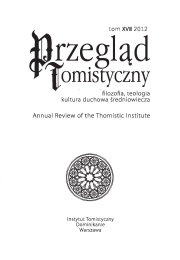Tomasz z Akwinu niewiele pisał o sumieniu?
Why Did Aquinas Hardly Mention The Conscience?
Author(s): Wojciech GiertychSubject(s): Ethics / Practical Philosophy, Middle Ages, Theology and Religion
Published by: Instytut Tomistyczny
Summary/Abstract: The IIa pars of the Summa of Theology says little about the conscience and much more about prudence. The modern mind prefers a reverse proportion. This is a result of the influence of nominalism, which has changed the understanding of the nature of the will and therefore also of moral agency. Since the Summa is divided according to three modes of being of God: in Himself and in creation, in the souls of the justified, and in Christ and in the sacraments, the IIa pars, deals with the fecundity of grace, as it generates virtuous life. Good action may be done creatively, professionally, with wit, out of charity, or it may be done half-heartedly, lazily, even as a sad necessity. It is the task of prudence, the virtue of creative resourcefulness to ensure the passage from intention, through deliberation, to the decision, and finally the execution. All of these stages require the joint and mutually influencing input of the reason and the will. Conscience precedes this entire process as it initially grasps the truth of some moral challenge and then it follows it, as it passes judgment on the executed action. The formation of character requires not only the training of the practical reason so that it would perceive the truth of the matter, but also the tutoring of prudence. Resistance against good action may lie not in the conscience, but in the inability to put into practice a recognized and demanding truth. When moral vigor is lacking then there is the temptation to escape from truth through rationalization that seeks to justify decisions that are contrary to the light of conscience. Prudence, that is not to be identified with caution, is the virtue that enables the focusing of the spiritual faculties and psychic energies so that the act will finally be done, and executed well. For this reason, prudence as a cardinal virtue has a fundamental role in the entire ethos. Furthermore, Aquinas shows that supplementary, mini-virtues of eubulia, synesis and gnome are also needed for the appropriate functioning of prudence.
Journal: Przegląd Tomistyczny
- Issue Year: 2012
- Issue No: XVIII
- Page Range: 159-174
- Page Count: 16
- Language: Polish

